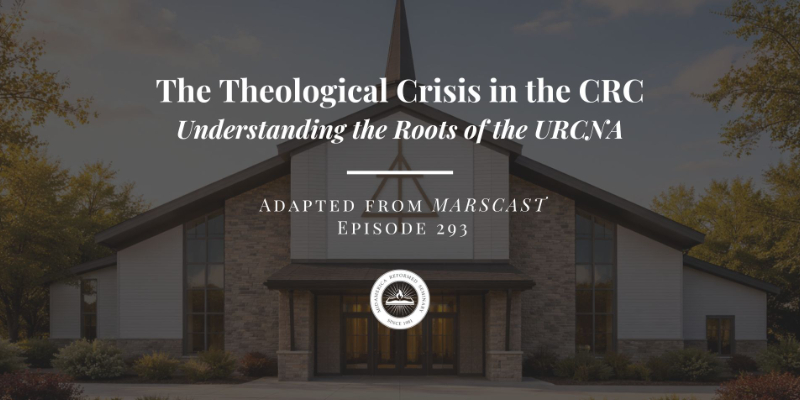
Luther and Calvin on the Real Presence of Christ in Preaching
This article is adapted from Dr. J. Mark Beach's article, "The Real Presence of Christ in the Preaching of the Gospel: Luther and Calvin on the Nature of Preaching," in the Mid-America Journal of Theology.
In the conception of Martin Luther and John Calvin, preaching is part of God’s redemptive work, a redemptive event itself, according to divine will and initiative. Moreover, preaching is the occasion for God’s redemptive activity because the Holy Spirit, by this means, communicates Christ and all his benefits to believers. On one level—the merely external—preaching is little more than a tool or instrument for communicating the inscripturated Word; on another level—the internal—it constitutes Christ’s voice, divine speech, the divine presence.
To be sure, Calvin is clearer than Luther in articulating for us not that this is so but how this is so. Calvin strongly accents the Spirit’s role in seeking to explain the presence of the divine in the altogether human activity of preaching. What we must not miss, however, is that for Calvin, and no less for Luther, Christ is truly present in human proclamation. The Spirit works in, with, and through human preaching in such a way that Christ is truly present in the preaching of the gospel. Calvin goes no further in explaining the divine presence in human preaching than to conclude it is mysterious, incomprehensible, and spiritual. But this does not minimize its reality. Perhaps we can make an analogy between Calvin’s doctrine of the real presence in the sacrament of the Lord’s Supper and his idea of Christ’s presence in gospel preaching. For Calvin, Christ is not somehow less present in the sacrament because he is spiritually present. In other words, simply because Christ is not present in the sacrament through the miracle of transubstantiation or consubstantiation does not mean believers fail to actually commune with him or fail to partake of his body and blood. Likewise with respect to the preaching of the gospel: Christ is audibly present in the sermon through the Holy Spirit. Christ’s voice is heard in the preaching of the gospel, though not because he appears visibly in the flesh and utters the words spoken. The spiritual presence of Christ in the preaching is therefore a real presence, not some kind of ruse or fiction.
T. H. L. Parker observes that where a Zwinglian conception of the Lord Supper prevails—which does not allow for a doctrine of the real presence—a similar conception of preaching prevails. That is to say, in the Zwinglian-like or non-sacramental model, while preaching is viewed as an exposition of the inscripturated Word which God may use to bear fruit in the lives of believers, ultimately it is just information. According to this conception, sermons have no sacramental quality. Sermons are not conveyers of the divine. In fact, sermons are not, in any sense, divine activity. Even when sermons are wholly faithful to Scripture as human expositions, they cannot be the Word of God. The sermon with its many words is like a piece of spiritual conduit through which “moments” of the Spirit-inspired Word (Scripture) flow. In this way human preaching may convey “the message of God,” provided it teaches the words of Scripture. In short, sermons impart information from the Bible, but they do not impart or communicate Christ himself and the benefits that belong to him.
This conception of preaching, over against Luther and Calvin’s view, characterizes most Reformed and evangelical churches in North America today, and fits with the Zwinglianism that often reigns in these same churches on the doctrine of the Lord’s Supper as well. We must understand that even the Zwinglian doctrine of the Lord’s Supper possesses no sacramental quality. Consequently wherever a Zwinglian-like conception of preaching preponderates, there can be no meaningful talk of Christ’s presence and activity in the human proclamation of the gospel.
The Zwinglian-like conception of preaching, at least as it pertains to the question of the real presence of Christ, artificially divides and separates Christ from his Word. If biblical sermons, for example, convey the message of the gospel, how can the sermon not be God’s Word to the recipients of that Word? May we legitimately separate the Word Incarnate, from the Word inscripturated, from the Word preached?
We observe that Luther and Calvin did not call preaching the voice of God or the voice of Christ as a form of theological hyperbole, as if they were trying to puff up preaching with artificial importance. On the contrary, both men labored to capture the sacramental significance of preaching. They believed that only God rescues sinners; only God calls sinners to himself; only God speaks to sinners—repentant and unrepentant—the Word of blessing unto life or of curse unto death; only God is Savior and Judge. And God performs his redemptive work through his Word preached.
Again, while it is true that Christ is not visibly present in the preaching of the gospel and does not vocalize the words of the sermon through his own resurrected body, nonetheless, his presence is real and certain. It is visibly intangible but as real as the sounds of the sermon in our ears. Of course, apart from faith, preaching is null and void; but by faith, we have ears to hear and eyes to see. And what do we hear? Is it not the voice of Christ? What do we see? Is it not the ministry of our risen Lord? If Christ works through his Spirit, is the work not his nonetheless? If Christ is present in the preaching of the gospel through his Spirit, is he not present nonetheless? A spiritual presence of Christ in gospel proclamation does not render his presence less real or second-rate. On the contrary, the sacramental nature of preaching is an affirmation that the divine is present in the human, that Christ in his transcendent glory is somehow immanent, that God is with us anew, that human words are taken up as divine speech.
This does not mean that God surrenders his incommunicable attributes; neither does it mean that he jettisons his divine nature as “totally other,” perpetually distinct from his creatures. The divine cannot be identified with the human. At best—as in the incarnation—the divine and the human form a union in preaching that is without confusion or blurring of boundaries, and without a transferring of distinct properties from God to man. At the same time, the divine and the human in preaching are inseparable. This analogy to christological distinctions is utilized guardedly, but such distinctions help us to conceptualize what is asserted and what is denied in averring the real presence of Christ in preaching. In affirming that preaching is God’s Word, it is not affirmed that the human preacher is God or Godlike, even in the sermonic moment. Human preaching remains human. But God is pleased to unite himself with our words, take them up as his own, so that the preached Word conveys the message of God. Consequently, recipients of biblical preaching hear the human voice of the preacher but receive by faith, through the Spirit, the Word of God for their lives. God speaks.
To fully appreciate the power of Luther and Calvin’s claim about preaching as God speaking, we need to peel away certain misconceptions and false presuppositions which make us misapply the distinction between God’s divinity and our humanity. The difference that exists between creature and Creator is of course not to be minimized. In fact, that difference is precisely what necessitates preaching. As Calvin repeatedly points out, unless God accommodates himself to us through human vessels we would not be able to endure his Word in our ears. We, as creatures, are too frail to look upon his majesty and too frail to be taught by his thundering voice. One would therefore be mistaken if he tried to “cut away” the human character of Scripture in order to obtain its divine character. Such an effort betokens a mistaken notion regarding God and his creation. God in his “God-ness” or divinity can act in, with, and through his human creatures without compromising the divine character of the action. Thus the proverbial kernel/husk distinction that is applied to Scripture from time to time is misinformed, and in many respects that type of distinction is wrongly applied to the preaching of God’s Word.
It is simply wrong to think that divine speech cannot be conveyed by means of human words or that the presence of a human or earthly element destroys the purity of the divine. If that is so, then both inscripturation and incarnation are rendered impossible, and the sacraments become mere signs devoid of certified promises. The Lord’s Supper in particular becomes a human exercise in “contemplation,” truly and merely a memorial. It is also wrong to seek the divine apart from the means God himself has chosen—even if the particular means he has chosen is human speech. Gustaf Wingren said, “Such an effort implies that God can be found and grasped beyond the human sphere whereas, as Luther says, the true God lives in the straw of the manger. From human mouths are heard the voice and tones of God, ‘not the voice that speaks from heaven above, but that which is down in the midst of men’.” This is why preaching bears a sacramental character. God is pleased to work an inward grace via the outward word— or stated slightly differently: God is pleased to work invisible grace through the audible word. That is to say, through the internal ministry of the Holy Spirit, the audible word is made to bear fruit. This fruit includes, particularly for Calvin, nothing less than the imparting of Christ himself.

J. Mark Beach serves as the Professor of Ministerial and Doctrinal Studies at Mid-America Reformed Seminary.
Recent articles




